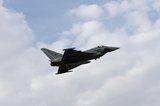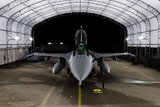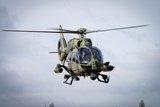How the Israeli Defense Forces overcame Iran’s attack
An Israeli jet being prepared to intercept Iranian UAVs during the 13 April attack. (Image: IDF)
On 13 April, the Israeli Defense Forces (IDF) demonstrated the effectiveness of its combined air defence system, as the use of simulation tools and close cooperation with other countries helped it achieved a 99% kill rate of 330 ballistic missiles, cruise missiles and armed drones launched by Iran.
One Iranian ballistic missile was confirmed to hit Nevatim Airbase in southern Israel’s Negev desert causing minor damage to the base which remained operational.
In recent months, US Central Command and the Israeli Air Force (IAF) have been intensifying efforts to achieve full operational coordination in the case of an attack similar
Already have an account? Log in
Want to keep reading this article?
More from Air Warfare
-
![Why the F-16 fighter jet remains a force to be reckoned with (updated 2026)]()
Why the F-16 fighter jet remains a force to be reckoned with (updated 2026)
The Lockheed Martin F-16 fighter jet remains in the limelight more than 40 years after its first flight. Shephard sums up the latest developments and details everything you need to know about the aircraft in 2026.
-
![Airbus Helicopters sees defence portfolio’s “strong momentum” continue into 2026]()
Airbus Helicopters sees defence portfolio’s “strong momentum” continue into 2026
The aerospace company’s 2025 performance figures revealed significant orders from various European armed forces and a boost in demand for its uncrewed offerings.
-
![January Drone Digest: MALE, rotary-wing and loitering munition UAVs dominate early 2026]()
January Drone Digest: MALE, rotary-wing and loitering munition UAVs dominate early 2026
The first month of 2026 has seen activity in the MALE, rotary-wing, and loitering munition UAV markets, with significant investments and commitments from Germany, Turkey, the UAE and the US. At the same time, questions over loitering munition performance in Ukraine highlight the growing scrutiny alongside rising demand.
-
![Singapore Airshow 2026: Early adopters and big spenders point to UAV market opportunities]()
Singapore Airshow 2026: Early adopters and big spenders point to UAV market opportunities
While an estimated $37.99bn is still to be awarded across the Asia-Pacific uncrewed aerial vehicle market, the balance of potential future spending is unevenly split between various countries, with significant opportunities to be found in the collaborative combat aircraft space.























